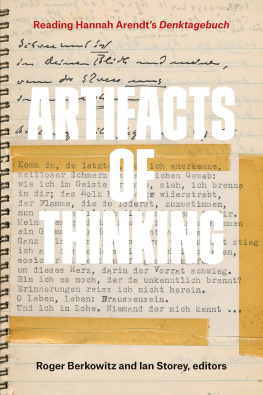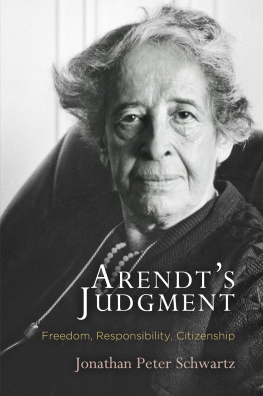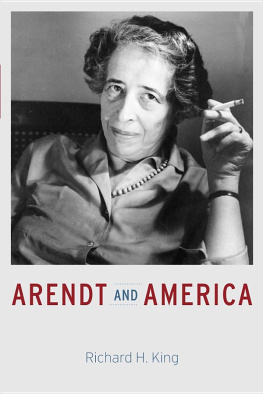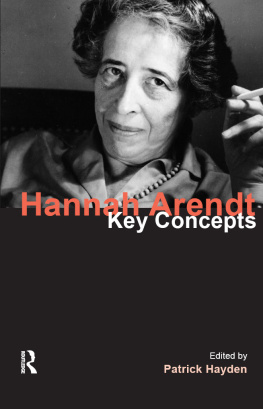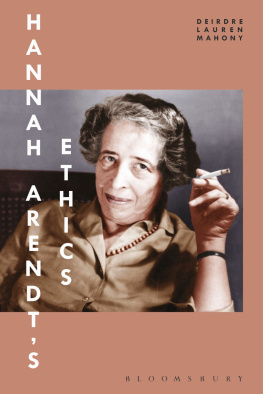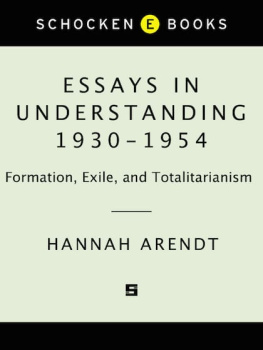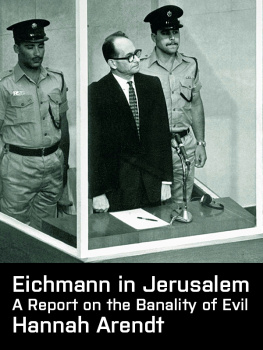Copyright 2017 Fordham University Press
All rights reserved. No part of this publication may be reproduced, stored in a retrieval system, or transmitted in any form or by any meanselectronic, mechanical, photocopy, recording, or any otherexcept for brief quotations in printed reviews, without the prior permission of the publisher.
Fordham University Press has no responsibility for the persistence or accuracy of URLs for external or third-party Internet websites referred to in this publication and does not guarantee that any content on such websites is, or will remain, accurate or appropriate.
Fordham University Press also publishes its books in a variety of electronic formats. Some content that appears in print may not be available in electronic books.
Visit us online at www.fordhampress.com.
Library of Congress Cataloging-in-Publication Data
Names: Berkowitz, Roger, 1968 editor. | Storey, Ian (Ian N.), editor.
Title: Artifacts of thinking : reading Hannah Arendts Denktagebuch / Roger Berkowitz and Ian Storey, editors.
Description: First edition. | New York, NY : Fordham University Press, 2017. | Includes bibliographical references and index.
Identifiers: LCCN 2016014313 | ISBN 9780823272174 (cloth : alk. paper) | ISBN 9780823272181 (pbk. : alk. paper)
Subjects: LCSH: Arendt, Hannah, 19061975 Denktagebuch. | Political scienceHistory20th century.
Classification: LCC JC251.A74 A825 2017 | DDC 320.01dc23
LC record available at https://lccn.loc.gov/2016014313
Printed in the United States of America
19 18 175 4 3 2 1
First edition
Ian Storey
Hannah Arendts intellectual diary, her Denktagebuch, is a unique record of an intellectual life and one of the most fascinating and compelling archives of twentieth-century literature, political thought, and philosophy. Comprising twenty-eight handwritten notebooksprimarily in German but partly in English and Greekthe Denktagebuch begins in 1950 and trails into sporadic notes in the early 1970s. By far the majority of entries, ranging from personal reflections to dense, argumentative engagements with other thinkers, are from the 1950s and 1960s. In these two decades, during which Arendt published The Human Condition, Between Past and Future, Men in Dark Times, On Revolution, and Eichmann in Jerusalem, as well as a number of essays, the Denktagebuch makes evident how closely Arendt read the works of her interlocutors, records previously hidden sources, and displays the dynamic, evolving nature of Arendts thinking.
Neither an Augustinian confessional nor an autobiography like those of Virginia Wolff, still less a narrative journal like the diaries of Samuel Pepys or Andy Warhol, the Denktagebuch is an uneasy fit in familiar literary categories. It is far more structured than the collection of musings and quotations that comprise Thomas Jeffersons commonplace book, but less formal than a collection of drafts and unfinished essays. The majority of entries are thematic, and some of the most common themes (often announced in Arendts own subheadings) include Thinking and Acting, Plato, Plurality, MeansEnds Categories in Politics, Metaphor and Truth, The Path of Wrong, Love, Marx, Hegel, On Labor, On Loneliness, On Heidegger, and On Philosophy and Politics. Arendts utterly unconstrained intellectual range, combined with the unusual form of the record, makes it nearly impossible to align the Denktagebuch with any familiar genre or subject heading, as the humorously strained classification of the work by the Library of Congress under Political Theory. Theories of the State: The Modern State attests.
Even the usual English translation of the title, Thought Diary, can be misleading, insofar as Arendt herself as a figure appears only rarely in her Denktagebuch and the first-person voice is almost never used. There are pieces of poetry and aphorisms by herself and others, as well as favored quotations and musings that stretch for pages. Some entries are polished short essays. Many are intense textual readings with etymological and philosophical commentary. Others are the rough working out of new ideas, which will later appear in her published writing. The notebooks manifest Arendts thinking and writing process and betray the intensity of her reading and thinking in a community of thinkers, but Arendt herself as a thinking subject occupying the privileged seat of I, remains elusive.
The absence of the authorial voice adds to the peculiar intimacy of reading the Denktagebuch, precisely because the text bears none of the signs and disturbances of having any potential audience other than herself in mind. The first notebook, written on Arendts return from a still war-shattered Europe and her first postwar encounter with Martin Heidegger, opens with a long, troubled reflection on responsibility for the past and reconciliation among its survivors. Belying the clearly personal nature of her reflections, Arendts tone is often a conceptually rigorous distillation of thoughts. She may be responding to conversations with Heidegger, as detailed in her letters, and readings of Nietzsche, but neither thinker is mentioned in entries. The opening metaphor of the weight of the past that is born on ones shoulders is taken from Friedrich Hlderlin, who again is not named and disappears behind Arendts analytical accounts of forgiveness, revenge, and reconciliation. The first reconciliation narrative is a personal working out of her thoughts, a seemingly finished product that Arendt nevertheless returns to in the Denktagebuch and amends many times over the next twenty years. Never do Arendts conceptually detailed and seemingly considered reflections on reconciliation appear in her published writings.
There is another voice in the notebooks, one evident in the opening entry of the last notebook, dated 1971. Arendt begins poetically as she struggles to come to terms with a life without her longtime partner and husband, Heinrich Blcher. The one-sentence entry bears the title Ohne Heinrich (Without Heinrich) and reads: Freiwie ein Blatt im Wind. Blchers death, Arendts entry suggests, leaves her free, like a leaf in the wind, a suggestive line that Arendt then includes in a letter to her friend Mary McCarthy. In that letter, Arendt goes on to cite explicitly from Reif Sind, the same poetic fragment of Hlderlin about the burden of the past that she takes as her inspiration for the inaugural entry of the Denktagebuch in 1950. Not only does this opening of the final notebook hearken to the books origin, but it also sets a once playful expression of freedom into a context of both grief and respect for the past. Arendt is profoundly aware of the mixed blessings of unconstrained freedom; the unbounded freedom of a leaf in the wind is without the tether to a past that gives life meaning.

